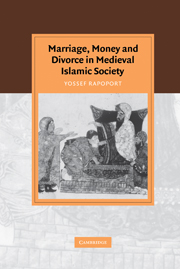Book contents
- Frontmatter
- Contents
- Acknowledgments
- Glossary
- List of abbreviations
- Introduction
- Chapter 1 Marriage, divorce and the gender division of property
- Chapter 2 Working women, single women and the rise of the female ribāṭ
- Chapter 3 The monetization of marriage
- Chapter 4 Divorce, repudiation and settlement
- Chapter 5 Repudiation and public power
- Conclusion
- Bibliography
- Index
- Cambridge Studies in Islamic Civilization
Chapter 1 - Marriage, divorce and the gender division of property
Published online by Cambridge University Press: 15 June 2009
- Frontmatter
- Contents
- Acknowledgments
- Glossary
- List of abbreviations
- Introduction
- Chapter 1 Marriage, divorce and the gender division of property
- Chapter 2 Working women, single women and the rise of the female ribāṭ
- Chapter 3 The monetization of marriage
- Chapter 4 Divorce, repudiation and settlement
- Chapter 5 Repudiation and public power
- Conclusion
- Bibliography
- Index
- Cambridge Studies in Islamic Civilization
Summary
In 732/1332, the Syrian historian Khalīl b. Aybak al-Ṣafadī happened to be in Cairo to witness the wedding celebrations of Ānūk, son and designated heir to Sultan al-Nāṣir Muḥammad. The bride – an amir's daughter – was accompanied by a trousseau that was carried over to the Citadel by 800 porters and 100 mules. Al-Ṣafadī, like many others who came to watch the public procession, saw all kinds of pillows, cushions, stools, chairs, silver and copper utensils, trays, bowls, rugs, earthenware pots, blankets and mattresses. The more precious items, such as clothing and jewelry, were concealed inside hundreds of dikkas – multipurpose wooden chests. A secretary in the entourage of the bride's father informed al-Ṣafadī that the gold alone weighed 80 Egyptian qinṭārs, that is, about 800,000 dinars. Another observer claimed that the total value of the dowry was closer to one million. The monetary value cited was merely an estimate, for there was no official record of the value of the trousseau. While the gifts the groom gave his bride were required by Islamic law and therefore recorded, dowries were not registered in Muslim marriage contracts.
A prince, like any other groom, was required to pledge a marriage gift (ṣadāq) at the time of the marriage contract, part of which was paid at marriage and the remainder deferred. In this marriage contract, concluded some time before the wedding procession, Ānūk promised a marriage gift of 12,000 dinars, of which he paid 10,000 at marriage.
- Type
- Chapter
- Information
- Marriage, Money and Divorce in Medieval Islamic Society , pp. 12 - 30Publisher: Cambridge University PressPrint publication year: 2005



